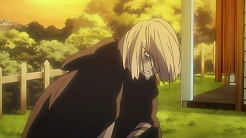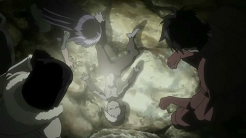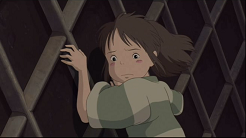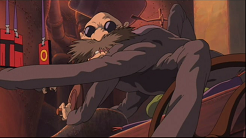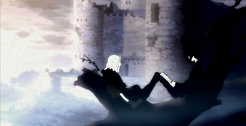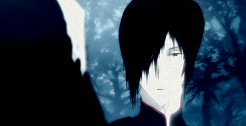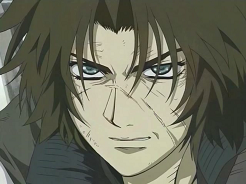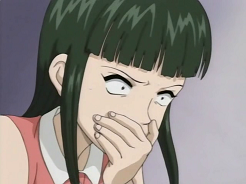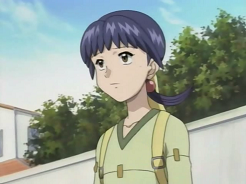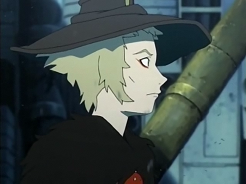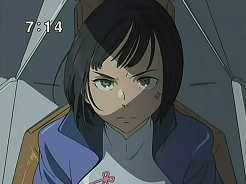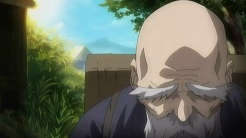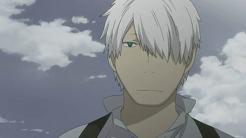Okay, so this is the final part of my 2010 Summary: the part in which I talk about all of the series that aired during the past year.
Overall out of all of the years that I’ve been blogging, 2010 was the worst one so far. It had a lot of causes, mostly with the huge decrease in different series: this allowed for a lot less series that could try out something unique than usual. On top of that, less series than ever dared to go beyond 13 episodes and a lot of potential was cut short. This is the year in which you can really see the effects on the economic crisis on anime. On top of that, Gonzo died, Sunrise only focused on OVAs and Movies, Madhouse focused most of its talent on Redline and Production IG only released surprisingly mainstream series, so many of the usual heavy hitters weren’t in their top shape. Instead, AIC released more moe shows than ever, and other studios were pretty much doing the same in going for the moe and fanservice.
At the same time though, I also can’t say that this was a bad year for the anime industry. Perhaps only the Winter Season was mediocre, but there still were a lot of interesting series. Especially Noitamina had its best year ever, and there was no shortage of good comedies throughout the entire year. I in any case disagree with the people who say that “anime is dying”, because in any case 2011 is looking to be very promising. We just hit a little dip this year that simply made it not as good as the other years. There’s still plenty of good stuff, and that’s what the rest of this post will be about. Of course, these are all my opinions. Feel free to share your own in the comment section.
The Sleeper Hits of 2010
This section has been added to this list on request by Kalandra, and it’s basically a list of series that I feel went under the radar. It’s not a list of the most underrated series, instead I really want to give some attention to series that many people didn’t give a chance. It’s basically a “list of series that I liked but didn’t have many members on MAL who watched it. It’s not in any order, because I have no idea how to properly rank these. This includes sequels that may have gone beyond people’s radars. I’ve limited this list to just ten spots, and interestingly Yojou-han and Sarai-ya Goyou despite my fears didn’t make it in (though granted, they do take up places 11 and 12…)
Cobra The Animation


Cobra was just one of those series that came from out of nowhere, did what it wanted to do and then just disappeared again. Most of it is indeed forgettable, but it does have an array of pretty neat ideas stuffed into its stories. In fact, it’s the entire point of the Cobra franchise to have these dream-like adventures that may not make any sense whatsoever, but do take the viewer to many different and imaginative places.
Gag Manga Biyori+


I believe that this was the only series this season that wasn’t aimed at kids and that didn’t even get its first freaking episode subbed, so of course it’s a sleeper hit. I’m going to continue to hype this one though, because it really is hilarious If you’re looking for a hyperactive comedy, you can’t really get more hyperactive than this.
Marie&Gali 1st Season


This one is for the people who don’t mind childish series, because at heart, Marie&Gali remains a kids’ show. It’s basically there to explain science to kids, and the first season does this with so much heart. Every single episode is different, no joke is wasted or recycled and it consistently made me laugh. Now, whatever you do, though: don’t touch the second season. It’s much worse.
Heartcatch Precure


Again this is very childish, but Heartcatch Precure has plenty of charms and character development to make up for it. The Precure franchise had gotten pretty notorious for the way that it just kept releasing the same show over and over again, but Heartcatch Precure is a real breath of fresh air in the way that it takes an overused concept and somehow makes it work.
Ookiku Furikabutte – Natsu no Taikai-hen


This one actually surprised me when I found out how few people actually checked it out. I thought that the first season was really popular, but I guess that this was the reason why Funimation explicitly announced that it wasn’t going to release this series. It’s a great sports series, though. I don’t think I’ve ever seen such a meticulously detailed look at baseball than here. If you like depth to your sports series, then go for this one.
Letter Bee Reverse


Again a really slow first season prevented a lot of people from checking this one out, I guess. Let me just say: it is all worth it in the end. The first season admittedly does have some gruelling parts to go through, but once the character development kicked in I was really hooked to this show.
Senkou no Night Raid


Admittedly, this is one show that’s very hard to like. It is packed with historical references and analyses and yet its first half comprises of random storylines: it can be very easily found boring. It is very rewarding for the ones with patience, though, because it turns into an interesting look at China in the 1930s and a typical series where the total is larger than the sum of its parts.
Yumeiro Patissiere – Professional


This mostly went under the radar because of its really long first season. Don’t worry though: it’s only 13 episodes long and packs a surprising amount of character development. You can follow it if you’ve watched the first two or three episodes of the original series, and if you’re tired of shoujo’s trend of seeing who can rip each other off the most, then this is an interesting recommendation as it’s a unique little shoujo series. Just don’t expect it to make the most amount of sense. ^^;
Tantei Opera Milky Homes


Before the start of the Fall Season, there was one show that based on its promo art and premise was dismissed by a huge amount of people. And indeed, if the creators played this type of show straight it indeed would have sucked. Don’t worry though, because it turned out to be a parody that doesn’t take any iota of itself seriously. It had a lot of fun poking holes in the phantom thief genres and recommended if you like parodies.
Soredemo Machi wa Mawatteiru


In 2010, most of the attention to Shaft went to Arakawa under the Bridge and people complaining about Dance in the Vampire Bund, so Soredemo Machi really went under the radar for quite a bit. It’s definitely not for you when you like your comedies to be based on punchlines, but the animation is surprisingly good and the dialogue felt quite realistic here. It’s a nice slice of life that does a bit more than just randomly showing the lives of a bunch of characters.
My 2010 Anime Awards
Worst First Episode
KissXSis


2010 unfortunately did have quite a share of utterly abysmal series, so it took me a while to figure out which first episode really was the worst out of all of them. There are the ridiculously poorly produced flash OVAs Tono to Issho and Haiyoru Nyaru-ani, but they do have this “anyone can make this; even you!”-vibe. There are kids shows like Digimon Xros Wars and Metal Fight Beyblade that were ridiculously poorly produced, but they remain fairly innocent. That SD Romance of the Three Kingdoms Gundam show was also pretty terrible, but that one was so bad that it became hilarious, so I’ll let that one slide as well. What I can’t let slide however is how much worse the bad fanservice shows have become, though. Special Credit goes to Ladies versus Butlers for its beyond awful writing, but the KissXSis TV-series takes the cake. This is everything that’s wrong with anime today: pointless fanservice, incredibly shallow characters, stupid premise, no creativity whatsoever.
Biggest Disappointment
Iron Man


There are sometimes these kinds of series in which everything seems right, and yet something doesn’t work along the way. I’ve had that with Durarara this year: it had a wonderful first half, but something in the second half didn’t sit right with me; it wasted too much time on build-up, it didn’t know whether it wanted to be Baccano’s spiritual successor or not, and too much time was focused on angsty teenagers. That wasn’t my biggest disappointment this year, though. Oh no. There is also this little series called Ookami Kakushi, which promised a great little mystery story from the original stories of Ryukishi07, only to end up completely rushed and stupid. Or how about Nurarihyon no Mago: it had a terrific director, and yet it ended up as nothing but an entire season of build-up. None of these disappointments was as bad as Iron Man, though. Iron Man was a series where so much hype had gone into. It had a great trailer, it was really promising to be another Madhouse epic… only for the actual series to be this ridiculously cheesy superhero flick.
Worst Series
Iron Man


This award only goes for the series that I actually finished… and yeah: again I have to go for Iron Man. The plot is ridiculously corny and the characters are just stupid. Beyond that, the individual stories have no creativity to them whatsoever, there is no depth, the series never really bothers to answer the why and how of its world. Out of all of the possible ways they could have taken this series, the creators ended up choosing one of the worst. Beyond that, Togainu no Chi also was pretty bad at times. For most of its airtime it at lest was a bit decent, but the final two episodes completely trashed any potential it could have had left, leaving it completely pointless.
Best Animation Studio
Bones


This is the award I give to the production studio whose collective works impressed me the most. This goes for the large ones, ie the ones who released three or more major works. In the previous years, there always was a clear cut winner, like there was one studio that really surpassed both itself and all of the others. In 2010, there really wasn’t a studio applicable for that: Madhouse created the great Yojou-han, but their mess on Iron Man was just… bad. A-1 Pictures was very diverse with many different looking and animated series. But they also made the disaster of Togainu no Chi. And Toei in the meantime was too busy ripping itself off with the new Digimon and Marie & Gali 2 in contrast with their great work on Heartcatch Precure and Marie&Gali’s first season. Overall, I still consider Bones’ best year to be 2009 (in which it also walked away with this award), and they did produce the pretty but otherwise completely underwhelming Heroman. Still, Full Metal Alchemist and Star Driver were some of the top visual feasts of the past year, so it’s once again my favourite production company of the year.
Most Promising Studio
Daume


This is the award I give to animation studios who are either completely new and really impressed me, or the small studios who suddenly significantly improved themselves compared to previous years. Daume is one of the latter: before this point they only worked on random moe shows. Then 2010 comes and from out of nowhere they deliver the incredibly unique Shiki without any seeming effort. I really hope that they can continue this trend that goes completely against what most other production studios seem to be doing right now.
Best Old Series I Happened to See This Year
Maison Ikkoku


I watched a lot of really good stuff this year, but my three favourites were without a doubt Nana, Maison Ikkoku and Patlabor’s second OVA. They’re all series that make excellent use of their long length: Patlabor’s OVA had some of the most interesting and imaginative scenes I have ever seen in an episodic anime, Nana was an emotional roller coaster and Maison Ikkoku showed character development over a scope that I had not yet seen before. They all had absolutely lovable characters, but I have to give the nudge to Maison Ikkoku for its incredible life-like portrayal of its characters.
Best Background Art
Sora no Oto


I really loved Sora no Oto’s realistic portrayal of the ruins of a European-esque town, and the background art played a huge part in that. It all just feels so incredibly authentic. Beyond that, Durarara and Uragiri also both had really well detailed background art that made great use of CG and Full Metal Alchemist also had a ton of eye candy for its backgrounds.
Most Pleasant Surprise
Heartcatch Precure


I try to check out every first episode of each new series that airs, but back in February, I actually had no intention of checking out the next Precure series. I really thought that it would be the same thing that we’ve been seeing for seven years now. I’m really glad that I was called out on it and ended up checking it out, because that first episode immediately convinced me that this would be a very special series. Other surprises were Yumeiro Patissiere’s second season which suddenly boasted more character development than I could ever have expected and Tantei Opera Milky Holmes which made great use of its seemingly dull premise to parody the heck out of it.
Best Music
Shiki


Finally: the first year in which a Bee-Train series isn’t walking away with this award. Of course, Yakumo’s soundtrack still is excellent, but it’s not the best this time. Other great soundtracks included the one from Letter Bee, Armed Librarians, Heartcatch Precure and Panty and Stocking, but my favourite was Shiki. They’ve got one particularly stunning track, and the creators knew it. You can listen to it over and over again without it getting boring, and it created a truly magnificent atmosphere.
Best Action
Full Metal Alchemist – Brotherhood


I have to give credit here for a bunch of series, for example Sengoku Basara’s first half and especially its sixth episode for delivering one of the best action episodes of the entire year (and it probably would have been the best action scene of the year if it wouldn’t have been for FMA) and Heartcatch Precure that despite being a shoujo series contained better action than a lot of shounen series out there. Star Driver’s action scenes meanwhile are all short but incredibly sweet, but none came close to the epic action of Full Metal Alchemist this year. Especially its finale was just awesome to watch but also just about all of the other climaxes were incredibly addictive.
Best Slice of Life
Cross Game


It may seem a bit boring to hand this award out to Cross Game yet again (it also walked away with this award last year), but it’s just so damn good at it: the way in which it portrays its characters during the slice of life moments are always hilarious and entertaining to watch. Screw the baseball matches, these character are at their best when nothing is happening. If it wasn’t for Cross Game, this award probably would have gone to either Sora no Oto or Soredemo Machi wa Mawatteiru for their great portrayal of their characters and despite not being 100% slice of life still were very interesting to watch when it just showed the characters randomly doing something.
Best Mystery
Letter Bee


I love mystery, but it’s a tricky genre done right. Good mystery lies both in asking and answering questions. The series that was probably the best in asking them was Sora no Oto with the really intriguing setting it created. In terms of answering, Kuroshitsuji always rocked with a ton of weird and interesting ideas. The show that had the best combination of both however was Letter Bee: its mystery always kept me watching, and when it finally got to the point of answering everything, it did not disappoint in the slightest.
Best Horror
Shiki


2010 only had very few good horror titles, and most of the horror series that were shown were only half horror anyway, like High School of the Dead, which despite its tons of fanservice had a consistent and gripping atmosphere or Rainbow, which also made great use of its huge atmosphere especially in the first half of the series. Kaidan Restaurant, while a very low-budgeted kids’ show turned out to be surprisingly decent at storytelling. But yeah, Shiki completely eclipses all of them. It takes a horribly abused subject material and reduces it back to the basics with a terrific atmosphere that can get really gruesome when it wants to.
Best Comedy
Gag Manga Biyori+


2010 introduced me to the weird world of Gag Manga Biyori. It’s completely bizarre, but it really has a collection of truly priceless episodes. No other series this year made me laugh this hard, this often. Some episodes are dedicated to parodying history, others at a particular genre and others are just one big joke that slowly gets built up. It’s surprisingly obscure at times, but its energy is unlike anything else I’ve seen. Beyond that, 2010 was a good year for comedy in any case. Squid Girl, Milky Holmes and Tentai Senshi Sunred were all absolutely hilarious in their own way as well.
Best Fanservice Anime
Panty and Stocking with Garterbelt


I usually don’t bother with the fanservice genre, because it’s riddled with bad and mediocre shows. 2010 also had plenty of them ranging from the mediocre Asobi ni Iku Yo to the terrible Ladies Versus Butlers and KissXsis to the downright porn of Yosuga no Sora. This year however, there were two fanservice series that I consider to be genuinely good and entertaining: B Gata H Kei with a witty portrayal of a teenaged girl and her twisted concepts of sex, and Panty and Stocking, which used its mature themes with the subtlety of an elephant in a porcelain shop. The fanservice obviously wasn’t the best part of the show, but the ballsy way in which it was used was a great breath of fresh air over seeing the hordes of bad fanservice shows that just keep popping up.
Best Script
Yojou-han Shinwa Taikei


Yojou-han was a series that really tried to make the most of its time. It’s really well planned out, not to mention the incredibly fast dialogue that tries to tell as much as possible about what’s going on and how the protagonist is feeling. Beyond that I also want to give credits for the Armed Librarians and the first half of Durarara, in the way that they weaved many seemingly unrelated storylines together.
Best Animation
Full Metal Alchemist – Brotherhood


Perhaps not as incredible as last year’s winner of this award, Bonen no Xamdou, it’s still pretty much no contest here: the animation for especially the action scenes is just epic, and this series keeps up this quality for 64 whopping episodes. Near the end during the non action series there are some weak moments, but they are completely eclipsed by the many, many interestingly animated action scenes. The second and third place go to the Spring Noitamina series of Sarai-ya Goyou and Yojou-han: Masaaki Yuasa ‘s animation was consistently excellent and really brought life to the characters. Sarai-ya Goyou was the same, but in a meticulously detailed way with many subtle movements.
Best Romance
Cross Game


Usually in a romance I prefer an actual relationship between the lead couple to take place, rather than them getting stuck in this endless “will they won’t they” loop. Cross Game however does it with such grace and wit that it becomes consistently enjoyable to watch. The way in which it teases the audience could have backfired horribly in the wrong hands (in the way in which for example Hanamaru Youchien refused to develop anything between the lead character and his love interest), but they do it here in such a way that subtly develops the couple without becoming annoying.
Best-Looking Graphics
Heartcatch Precure


This is the award I hand out to the series with not perhaps the best animation, but the one with the visuals that really impressed me. In 2010, there were four series whose graphics I really liked: Full Metal Alchemist – Brotherhood, Yojou-han, Sarai-ya Goyou and Hearcatch Precure. I’m still not sure why, but at the time of writing this, the fan of cute things inside of me has really won me over the most. For a mahou shoujo, Heartcatch Precure really looks amazing; it has the most awesome character designs, the transformation sequences are the best transformation scenes that I have seen since Utena. It’s incredibly cute, fluffy and sugary, but with every episode I could count on this series leaving a visual impression on me.
Most Imaginative Setting
Angel Beats


This award is for the series that puts the most interesting and original ideas into its setting. Think of fantasy series as the Armed Librarians and Full Metal Alchemist and the way in which their world works, or the way in which Senkou no Night Raid came with such an incredibly risky subject material of the Japanese actions in China in the 1930s. Index also was quite interesting with its relation between magic and technology. Angel Beats however edges this one for me. I know that the series had its problems and all, but in 13 episodes it really tried to stuff as many interesting ideas as possible. Every few episodes or so, the way that the characters looked at the setting completely changed. It’s a typical series that doesn’t really care about solid storytelling but is more interested in delivering an interesting world and having fun in the process, ad that’s what I liked about this series the most.
Best Story
Armed Librarians – The Book of Bantorra


The two behemoths in terms of story this year were for me easy to think of: The Armed Librarians and Full Metal Alchemist. Both had epic stories that just kept taking twists and turns that just continued to change,. I have to give the edge over to the Armed Librarians here though: in every single arc, it managed to interweave its different plot threads and make them come together in a completely unexpected way. It was amazingly planned out and written together and pretty much made every single episode a blast to watch.
Top 20 Anime 2010
#20: Senkou no Night Raid


The moment where Senkou no Night Raid really impressed me was the moment where it really dared to delve into some of the most controversial topics out there, without becoming drenched in nationalism unlike you see with many different anime who try to have these international plots. It’s easy to find this one boring, but I loved how it both treated itself seriously and yet made it clear that it’s a fantasy story at the same time. Its main problem was its characterization and how people were changing sides a little too often,but it still was a fascinating look at morals and values that really took some HUGE risks here.
#19: Star Driver


Now, Star Driver at this point is only half finished, and it has a long way to go before it can even get close to how good Utena was. So far though, it’s really on a good direction with its characterization: it really tries to stuff as much into one episode as possible and at the halfway point this is really starting to pay off. With battles that are short but incredibly sweet, I’m really looking forward to see whether it can actually pay off.
#18: Otome Youkai Zakuro


Otome Youkai Zakuro was another one of those series that looks like nothing special, yet turned out to be quite a refined shoujo romance. The story was simple but because of that it really was able to give the characters the attention they deserved. There are some unnecessary clichés here and there, but overall it’s surprisingly well written and directed.
#17: Shinrei Tantei Yakumo


The interesting thing about Yakumo was that it was one of the shows that was looked forward to the most, and yet when it actually aired you hardly heard anyone about it. The first episodes of Yakumo were quite rushed indeed, but it eventually came together quite nicely, even without the inclusion of Koichi Mashimo. It’s got a great cast of characters and a bunch of excellent main villains and I also really liked how well it was able to use its own build-up. It’s far from Bee-Train’s best, but still a very solid series.
#16: Gag Manga Biyori


Gag Manga Biyori+ simply was amazing. Its episodes only were five minutes long, yet I was looking forward to it every single week. It consistently had me in stitches unlike any other comedy this year. The direction was absolutely brilliant, and I don’t think that I have ever seen an anime with this much concentrated energy as this thing. And yeah sure, the graphics are really basic and there is no coherent storyline whatsoever. Who cares? It was absolutely hilarious.
#15: Ookiku Furikabutte


The big flaw of Ookiku Furikabutte this year was that it was way too short: it’s incredibly slow paced: that’s not going to fit in just 13 episodes. Beyond that though, it really was better than ever as a series: the animation received an upgrade, the characters were more interesting, the dialogue was better,. with the right time this really would have been even better. It really was one of the most detailed and realistic portrayals of baseball out there.
#14: Kuroshitsuji


Kuroshitsuji II was just… amazing. It completely let go of the manga material, trolled just about everyone multiple times and created an incredibly entertaining story that made excellent use of the unique gimmick of this show of incredibly over the top butlers, without all of the annoyances of the first Kuroshitsuji series. The beginning fillers were… annoying, but everything paid off wonderfully in the end with a bunch of excellent villains. It was silly, but also very creative and I really hope to see more of these kinds of sequels in the upcoming years.
#13: Rainbow


Rainbow always had a problem with its acting: there really was a ton of ham and cheese in this series. What managed to save it was its story, which really was excellent. The two halves of the series form a stark contrast with each other, and pack a huge amount of character development. It really was great to see everyone grow up, but even the time that the characters spend in prison was incredibly atmospheric.
#12: Kuragehime


It’s perhaps not Josei at its finest; it had too many one-dimensional characters and an unresolved plot for that, but Kuragehime consistently enjoyable throughout its entire airtime. Its characters were ridiculously addictive and its energy and acting made every episode a lot of fun to watch. It’s a great romantic comedy that was really well directed.
#11: Seikimatsu Occult Gakuin


A-1 may not have been my favourite production company of the year, they really have been dominating the lower half of my top 20 of the year (they occupy four of the spots between 10 and 20), and with good reason: they came with a lot of different, unique and ambitious series that apart from perhaps Togainu no Chi were very interesting to watch in their own way. The one I consider to be the best though was Occult Academy, a roller coaster ride that takes detours through Ferris wheels and merry-go-rounds. It’s impossible not to be disappointed by it at the end in some way or the other due to pacing issues, but the highs of this series really were absolutely stunning. It had three episodes that were just absolutely amazing, and looking back, they were worth the bore of some of the strange build-up arcs that focused way too much on Maya’s character.
#10: Cross Game


Cross Game is slice of life at its finest. It was great to just watch the characters randomly interact with each other. The character development was really good, slowly showing them age through adolescence. It’s just a shame that it’s also a baseball series. The baseball arcs were just too simple and one sided. Every time they took place, I just kept wishing them to end fast so that this show could go back to what it was really good at.
#9: Letter Bee


Letter Bee is a very hard series to get into: the first season was filled with uninteresting arcs and fillers. It really took a long while to get going. Still, the cliff-hanger at the end of season one was one of the best cliff-hangers for a next season I have ever seen, and the second season is continuing to develop both its plot and characters. The characters have become absolutely lovable, and even the individual episodes that have nothing to do with the main plot are really worth the watch. it’s a unique little shounen series.
#8: Kobato


Kobato has since it aired become one of my favourite examples of a show that starts of slow, but ends wonderfully. Most of the first half was random build-up with stories that were marginally interesting. The second half however saw a complete change of pace. Kobato grew up, the characters got more and more detailed and likeable, and the series only just got better and better as it went on with a heart-wrenching conclusion.
#7: Heartcatch Precure


Heartcatch Precure just came and delivered a perfect portrayal of how a classic mahou shoujo series should be. The action is consistently excellent throughout the entire series, the different stories it tells are al incredibly charming, the lead characters are all excellent and well development. Everything about this series is just incredibly cute with a lot of frills and sparkles, not to mention that it really likes to show of its admittedly gorgeous transformation scenes but the charms and energy of this series made all of it worth watching. it really is top-notch entertainment that can both be childish and serious. It’s definitely the best mahou shoujo to have aired in years.
#6: Shiki


In this year’s top 10, I really had difficulty choosing my numbers 4, 5 and 6. In the end I admit that I liked the numbers 4 and 5 slightly better than Shiki, but this still remains an amazing horror series with a fantastic conclusion. I’ve said this many times before but the exact reason why it rocks is filled with spoilers, so just check it out for yourself.
#5: Giant Killing


Now this is a terrific example of how to do a series on a very low budget: the animation of Giant Killing is nothing special, yet it looks unique, with even the most minor side characters having unique character designs. Throughout its airtime, Giant Killing proved to be a ridiculously addictive series, and if board games aren’t counted as sports then it’s turned into my favourite sports series ever. Especially the finale just keeps the cliff-hangers coming and changes constantly. The entire cast is chock-full of lovable characters, ranging from the soccer players themselves to the coaches, supporters, journalists and managers: everyone on this series is important. On top of that, I don’t think I’ve ever seen a series that handled its foreign languages as well as this series: English, French, Portuguese, Dutch. It was an incredibly international series.
#4: Sarai-ya Goyou


Sarai-ya Goyou turned out to be a ridiculously solid character study: it’s incredibly detailed from start to finish with very subtle characterizations. It’s very realistic and an excellent portrayal of how life was like in the past. It’s got some very complex characters for a show that’s only 12 episodes long, and they all face their own issues. Masanosuke was a great character to watch and see change, and Yaichi’s conclusion also really was excellent. I’m a big fan of Tomomi Mochizuki as a director, and her really managed to breathe life into Fujimi Ono’s manga.
#3: Yojou-han Shinwa Taikei


In 2010, it finally was time for Masaaki Yuasa to show his magic again. And granted, Yojou-han is not as good as Kaiba was. It comes pretty darn close though, with its ground-hog day-esque approach to storytelling that comes together in a really excellent ending that ties the entire series together perfectly. I also love the incredibly fast dialogue and the relentlessly fast pacing of this show that at the same time never rushed. It’s a great example of a mature series that had its own visual identity and really needs to appear more in anime.
#2: Full Metal Alchemist – Brotherhood


In a way my number 1 and 2 are quite similar: they both tried to be the epics of the year in their own way and it took me a long while to figure out which was the one I liked best. The Brotherhood Series was a huge improvement over the first season, it was consistently entertaining, the action was amazing, the few moments of comedy were just hilarious and the entire story just kept going on and continued to develop its story for 64 episodes long. The combination between the story and characters reached some amazing heights and even though it’s not my favourite of the year, I still love this one to bits.
#1: Armed Librarians – The Book of Bantorra


In the end, what sold me completely to the Armed Librarians was the way in which it was told: I mean, this show never took any breaks: it was always developing its story, pushing forth new and outrageous plot twists and trying everything together in ways that just continued to surprise me. It used its characters wonderfully and its storytelling just kept making me come back for more. It has also been by far the series that I had the most fun with blogging. I know that it’s a rushed series and that some f the characters could be more solid and all, but the good things about this series far outweigh the problems I had with this series. It entertained me like no other series this year and that’s why I chose this as my favourite show of 2010.



































































































































































































































































